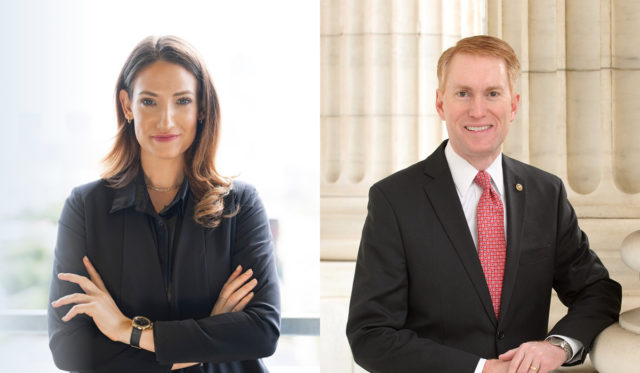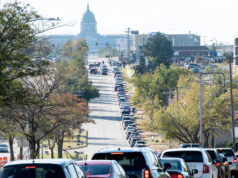
While incumbent Republican Sen. James Lankford seems poised to win his second full term in the United States Senate, his opponent, Madison Horn, is hoping the perfect storm delivers Oklahoma Democrats their first U.S. Senate victory in 32 years.
Lankford holds a sizable lead over Horn in recent polling, and he has also raised nearly $7 million for his reelection bid. Horn has raised about $280,000.
None of that comes as much of a surprise. Lankford is a conservative Republican in a state full of them and has been in Congress for more than a decade. Horn, a 32-year-old cybersecurity expert, is seeking office for the first time. She has tried to get Lankford to debate her, but he has steadfastly refused.
Horn recently ran into Lankford while campaigning and she broached the subject with the 54-year-old senator.
“It was interesting. I met him this past weekend while campaigning at an OU football game,” Horn said in October. “He was very blunt and said absolutely not.”
Horn has made rural campaigning and rural issues the centerpiece of her campaign, while pitching herself as a committed moderate. Lankford, who survived a primary challenge from the right, was recently endorsed by the Tulsa World, which said he should “abandon divisiveness” and regain his reputation as a “voice of reason.”
Two other candidates, Libertarian Kenneth Blevins and independent Michael Delaney, are also on the Nov. 8 ballot.
‘Rural areas have been a big focus’
Horn grew up in Stilwell, one of the state’s poorest communities in rural Adair County, not far from the Arkansas border. Horn says growing up in rural Oklahoma helped shape her, and spending time in out-of-the-way places has become an important part of her campaign.
“One thing I continue to hear from people is how shocked they are that I show up,” she said. “Rural Oklahoma communities aren’t used to elected officials showing up. That’s a dangerous precedent, because I think it continues to create distrust that we’re experiencing between people and their elected officials.”
Horn said she has been well received in rural areas.
“Growing up there, I know first hand what it’s like to have to travel to meet basic medical needs,” she said. “Issues like water potability and broadband access continue to be there.”
Horn said she hears about inflation wherever she goes. In the national midterm elections, Democrats have been pounded by GOP candidates across the country as inflation remains high.
“It’s obviously something people take notice of and talk about,” Horn said. “We have to stay flexible to address rising costs. Inflation has forced some small businesses to close, or dramatically alter the way they operate. I think the most obvious thing is we need to address the low-hanging-fruit areas, like American infrastructure and energy independence.”
Immigration, abortion access and student loan forgiveness are also prominent issues in this election.
On abortion, Horn opposes the Dobbs decision handed down by the U.S. Supreme Court earlier this year and believes abortion rights need to be codified in statute.
“I think what’s clear is that we’ve seen a reaction across Oklahoma and the country from people who believe women should have the right to reproductive health care and that those decisions should remain with women and their doctor,” she said. “It’s an overreach into women’s lives and it’s wrong.”
Horn isn’t totally in line with national Democrats when it comes to student loan forgiveness. She believes the Biden administration’s plan to forgive up to $20,000 in student loan debt, which has run into stiff resistance from Republicans, creates budget challenges.
“To be clear, I believe education is the gateway to the future,” Horn said. “I do believe we need alternative pathways for those who don’t want to go to a four-year college. But for the United States government to forgive all student loans, I think that puts us in a budgetary slippery slope. I don’t believe in aggressive student loan forgiveness.”
Lankford frequently cites immigration as a failure for Democrats, but Horn doesn’t see it that way. She sees the situation at the country’s southern border as a humanitarian crisis that deserves a more humane approach than what has been offered by Republican governors such as Ron DeSantis of Florida and Greg Abbott of Texas, who have shipped migrants off to northern states in moves that have been criticized as cruel attempts to score political points with GOP base voters.
“When we talk about the problem at the border, there’s no one-size-fits-all solution,” Horn said. “We need to humanize these individuals and not dehumanize them. We need to recognize that there is a humanitarian crisis that is forcing mass migration. We don’t need to be pointing fingers at each other. We need to be solving the problem.”
To that end, Horn said she’s running to represent everyone in Oklahoma.
“I’m not in this to represent Democrats or Libertarians or Republicans, I’m running to represent everyone,” she said. “I’m not sitting here waving the Democratic Party flag. There is too much division in the country. I am an unapologetic moderate, and moderates solve problems rather than spread divisive rhetoric.”
‘All you have to do is cross the border and say the magic words’
Lankford is running for his second full six-year term in the Senate. He was first won the seat in a 2014 special election following the retirement of the late Sen. Tom Coburn. Before that, he served two terms in the U.S. House of Representatives after working for 15 years as the director of student ministry for the Baptist Convention of Oklahoma.
Lankford easily defeated primary opponent Jackson Lahmeyer in the June Republican primary, and during the general election campaign he has barely talked about Horn at all. His social media channels cover a wide variety of Republican meat-and-potato causes, but when it comes to Horn, they include virtually nothing.
On a variety of hot-button national issues, Lankford’s emphasized positions seem aimed at Oklahoma’s dominant voting bloc.
On immigration, Lankford has opposed the Biden administration’s asylum processes and other border policies.
“All you have to do is cross the border and say the magic words, ‘I have credible fear,’ and the Biden Administration hands you a piece of paper, and you’re in the country for the next eight years,” Lankford said in statement earlier this year.
The basic U.S. asylum policy predates the current administration, though Biden has made administrative changes to speed up the asylum claim evaluation process in ways that critics argue will attract more asylum seekers.
Lankford has also opposed the Biden administration’s efforts to lower prescription drug costs for seniors. Lankford’s chief complaint is that the plan includes an excise tax of up to 95 percent on drug companies that do not comply with a pricing negotiation process with Medicare. He has argued that the plan would discourage innovation.
“People hate paying high prices for drugs, but they are very grateful for the remarkable innovation that has led to treatments for millions of Americans and billions of people around the world with cancer, Parkinson’s, multiple sclerosis and countless other diseases,” Lankford said in a press release. “Without question, drug price controls will crush drug companies that the government doesn’t like and will discourage large-scale private investment in drug innovation, leading to fewer cures, fewer drug options and limiting drug access for senior adults on Medicare.”
Lankford also criticized the delay in the plan’s implementation. Most of the price controls won’t take effect until 2027. He has said that opponents of the plan have been unfairly criticized.
“It is an easy political shot to say that anyone who does not believe in government price controls for drugs must support high drug prices, but that ignores the real-life consequences of price controls,” he said earlier this month. “The price of milk and eggs is also way too high right now, but does anyone think that the price and supply of milk and eggs would be better if the government ran the operation and set the prices?”
In his opposition to Biden’s student loan forgiveness plan, Lankford drew on his own memories of putting himself through college during a speech in Muskogee.
“This makes me sound like I’m heartless, but this somewhere between $300 billion and about $750 billion handout on student loan forgiveness,” he said. “When you do forgiveness, somebody still has to pay that bill — it’s not like it just evaporates into the ozone layer. I worked two jobs in college, my single mom was busting her tail, and in between what she was doing to help and what I was doing to be able to pay off my own debt.”
Blevins would vote to de-schedule marijuana

Welder Kenneth Blevins is running as a Libertarian in the race. Among his biggest priorities if elected would be the establishment of term limits, support for the Second Amendment and making it easier for Americans to own firearms.
A welder and graduate of Oklahoma State University, Blevins seeks to limit “frivolous” government spending on things such as “grant-funded research of the sexual habits of quail on cocaine,” according to his website. Blevins also favors de-scheduling marijuana and increasing government transparency.
Delaney would support electric vehicle infrastructure
Michael Delaney is running as a “progressive independent” in the Nov. 8 general election. According to his website, Delaney would prioritize increasing wages for those who work full time, and he would oppose a national abortion ban.
“People who work full time shouldn’t live in poverty,” Delaney writes atop a list of what he stands for. “Homelessness shouldn’t exist in the richest country in the world.”
Delaney says he would also work to end Citizens United, improve incentives for those wanting to buy electric vehicles and create infrastructure to support a shift away from fossil fuels. He also views health care as a human right.





















